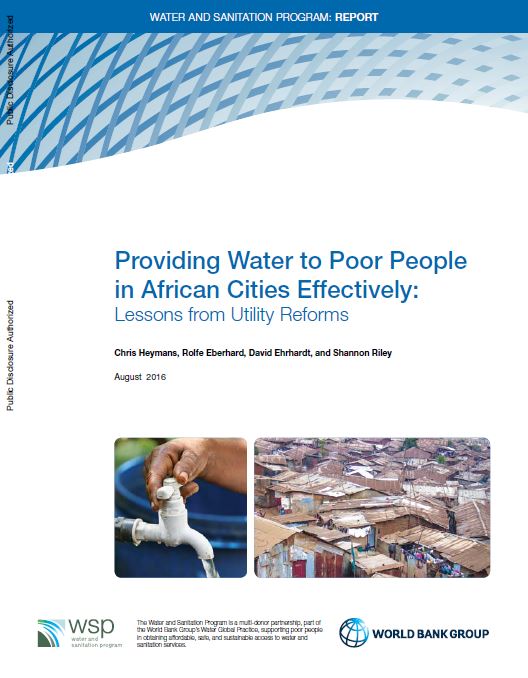Providing Water to Poor People in African Cities: Lessons from Utility Reforms
 |
informe Aug 2016
Ed. WSP - Washington World Bank - Washington
Formato descargable: PdF
Descargable desde el editor
Un editor presentación
Résumé:
La recherche a montré que l'eau courante ŕ domicile est un des critčres clés pour assurer de bonne conditions sanitaires (souvent, les points d’eau partagés ne permettent pas d’assurer les besoins de base des familles qui en dépendent). Cependant, la part de la population urbaine bénéficiant de l’eau courante ŕ domicile a diminué en Afrique, passant de 43% en 1990 ŕ 33% en 2015. Les plus vulnérables, dont les niveaux de revenu restent faibles, sont le plus touchés par l'insuffisance de l'approvisionnement en eau. Ce document analyse les services d’approvisionnement en eau de 5 villes d’Afrique subsaharienne et tente de tirer les leçons de leurs succčs pour servir les tranches les plus pauvres de la population. Abstract:
Research shows that water piped to the premises is the standard to ensure adequate health (families who rely on water carried from shared taps often do not get enough water for basic needs). Yet the share of the urban population with water piped to their premises has declined in Africa, from 43 percent in 1990 to 33 percent in 2015. Poor families are the least likely to have water piped to their premises, and the fact is that income levels remain low for many city-dwellers. The most vulnerable, therefore, will bear the brunt of the inadequacy of water supplies. This paper analyzes the water supply of 5 cities in Sub-Saharan Africa and tries to draw lessons from their successes in serving the poor.
Destino Audiencia:
Palabras claves: |
abastecim. agua inocua (CI) (DT) (HP) (ope) , Africa (CI) (DT) (HP) (ope) , servicios públicos de agua potable (CI) (DT) (HP) (ope) , urbano (CI) (DT) (HP) (ope) |
Países: |
Burkina Faso (CI) (DT) (HP) , Etiopía (CI) (DT) (HP) , Ghana (CI) (DT) (HP) , Kenia (CI) (DT) (HP) , Mozambique (CI) (DT) (HP) , Níger (CI) (DT) (HP) , Nigeria (CI) (DT) (HP) , Senegal (CI) (DT) (HP) , Somalia (CI) (DT) (HP) , Sudáfrica (CI) (DT) (HP) , Tanzania (CI) (DT) (HP) , Uganda (CI) (DT) (HP) , Zambia (CI) (DT) (HP) |
Editores/Difusores: |
|
WSP
-
Water and Sanitation Program - Washington - Estados Unidos |
World Bank - Washington - Estados Unidos |
Si hay un enlace roto, estaremos encantados de recibir un mensaje: communication@pseau.org